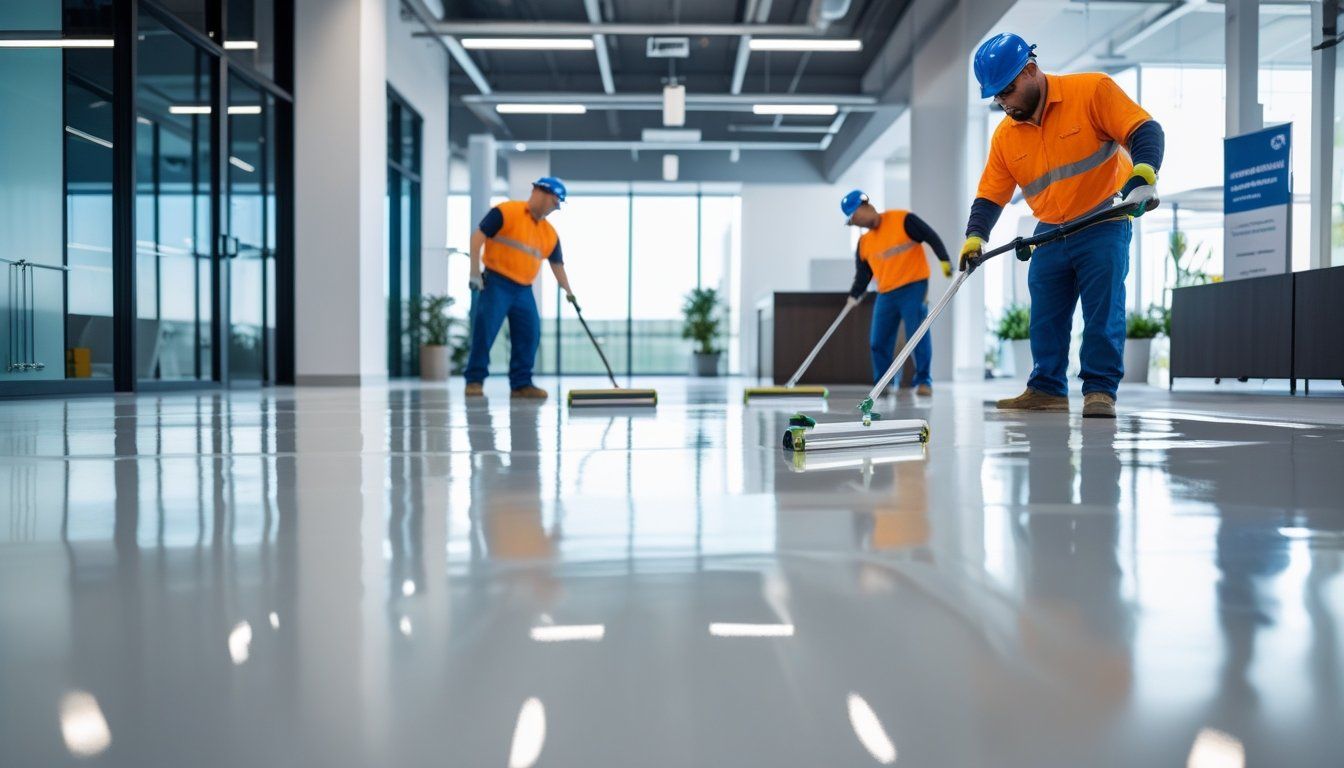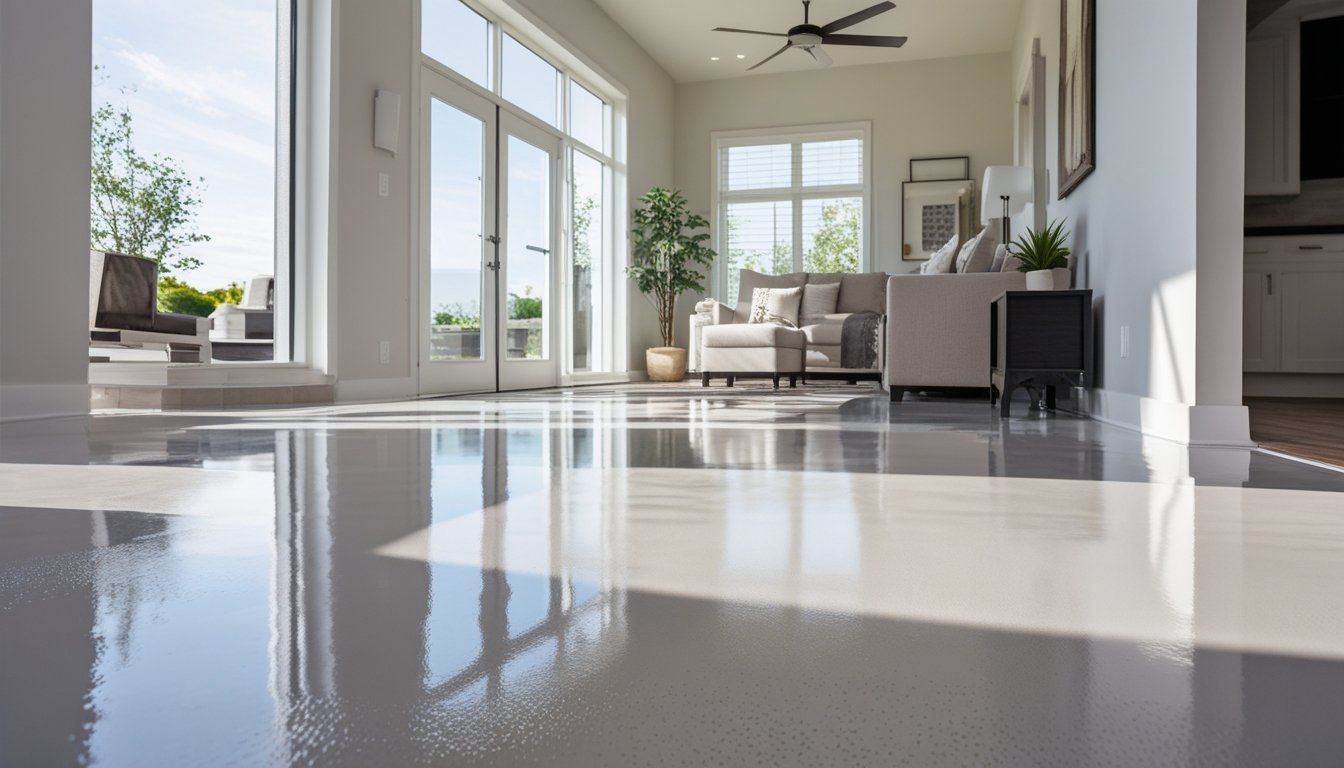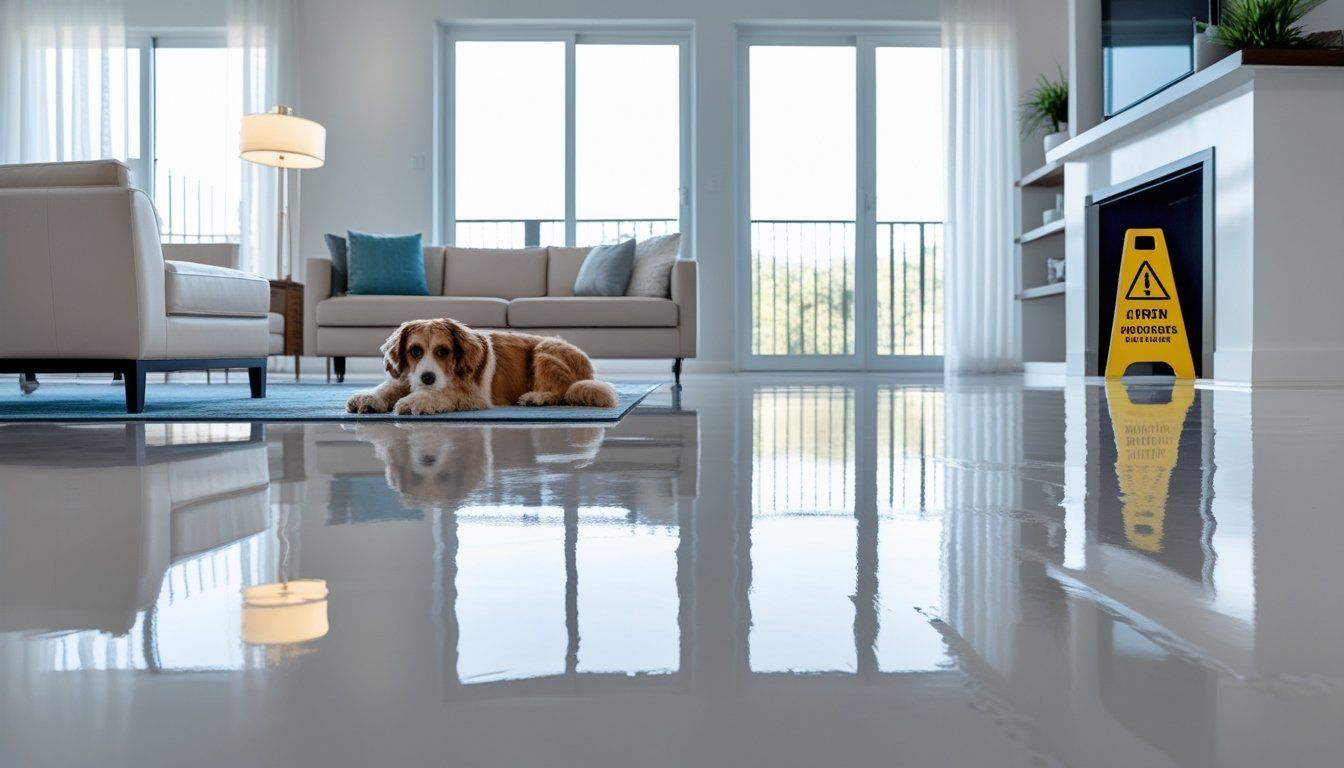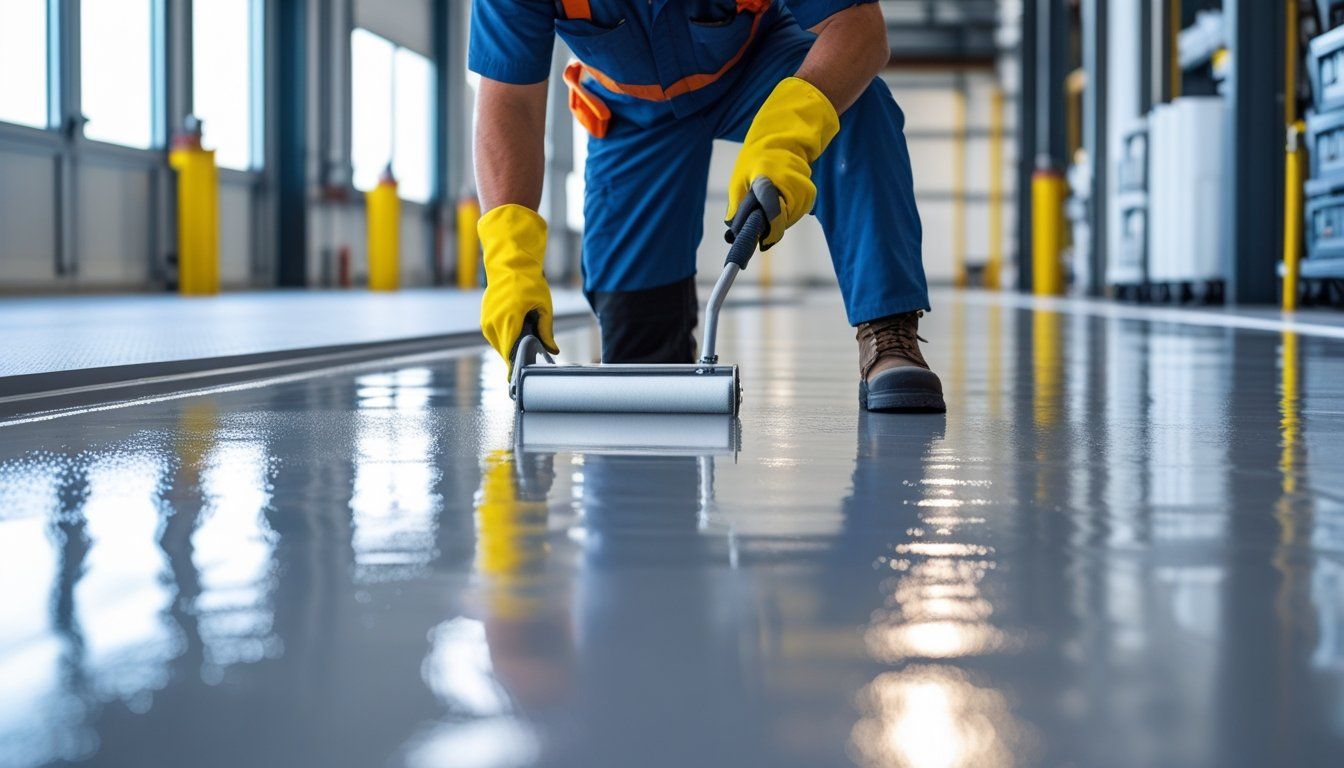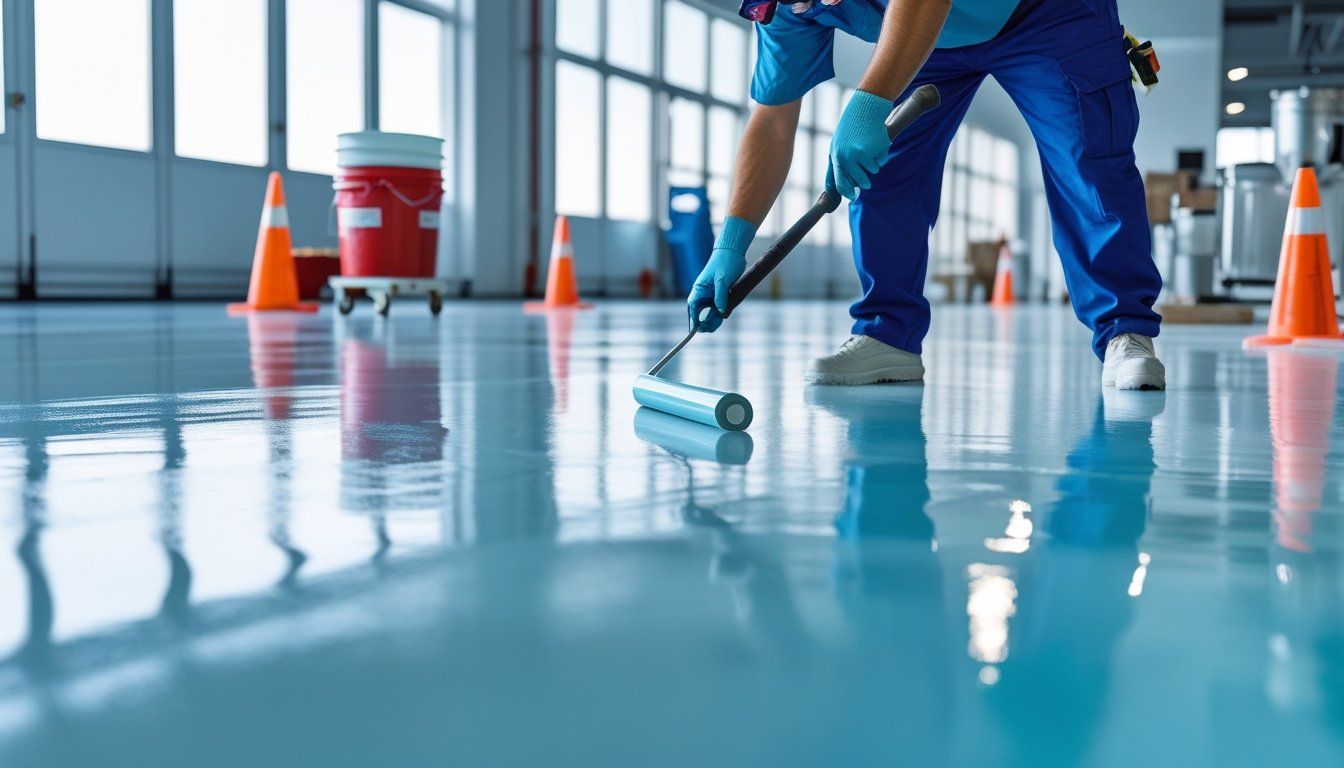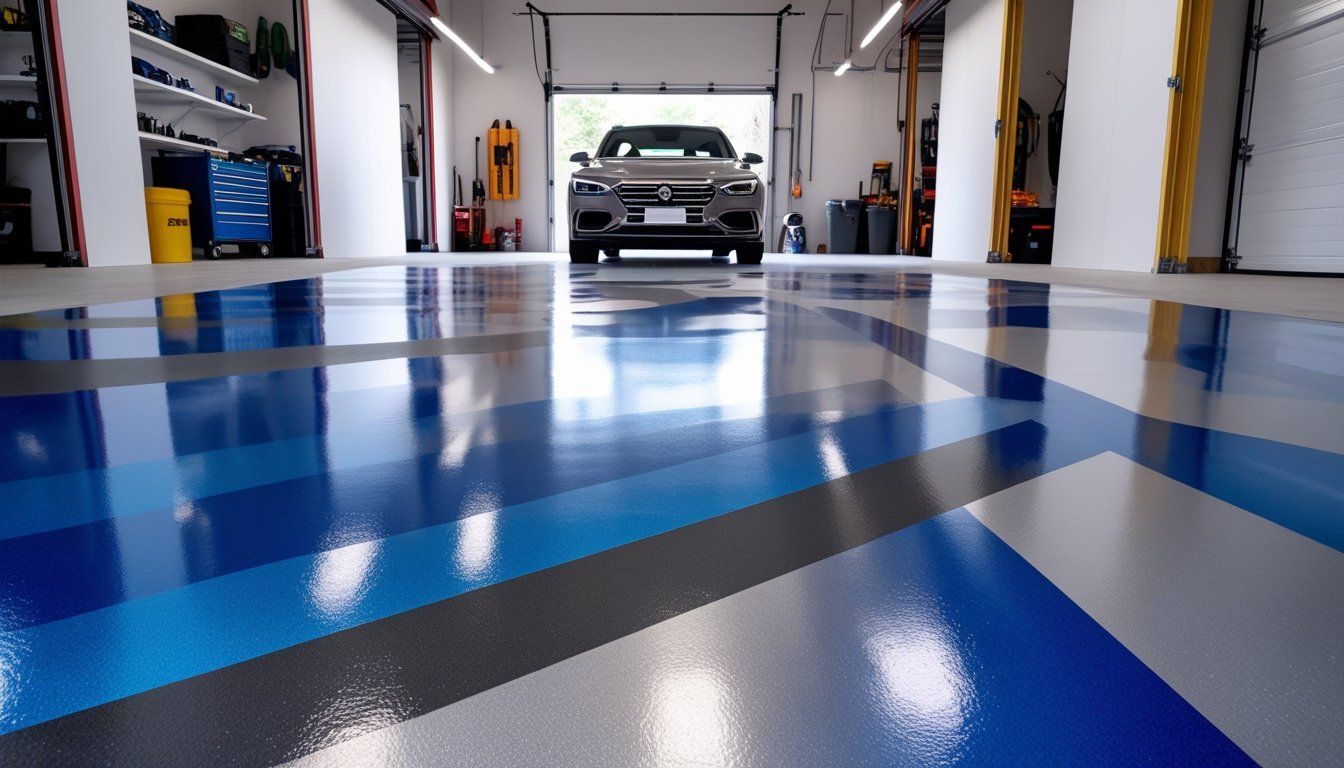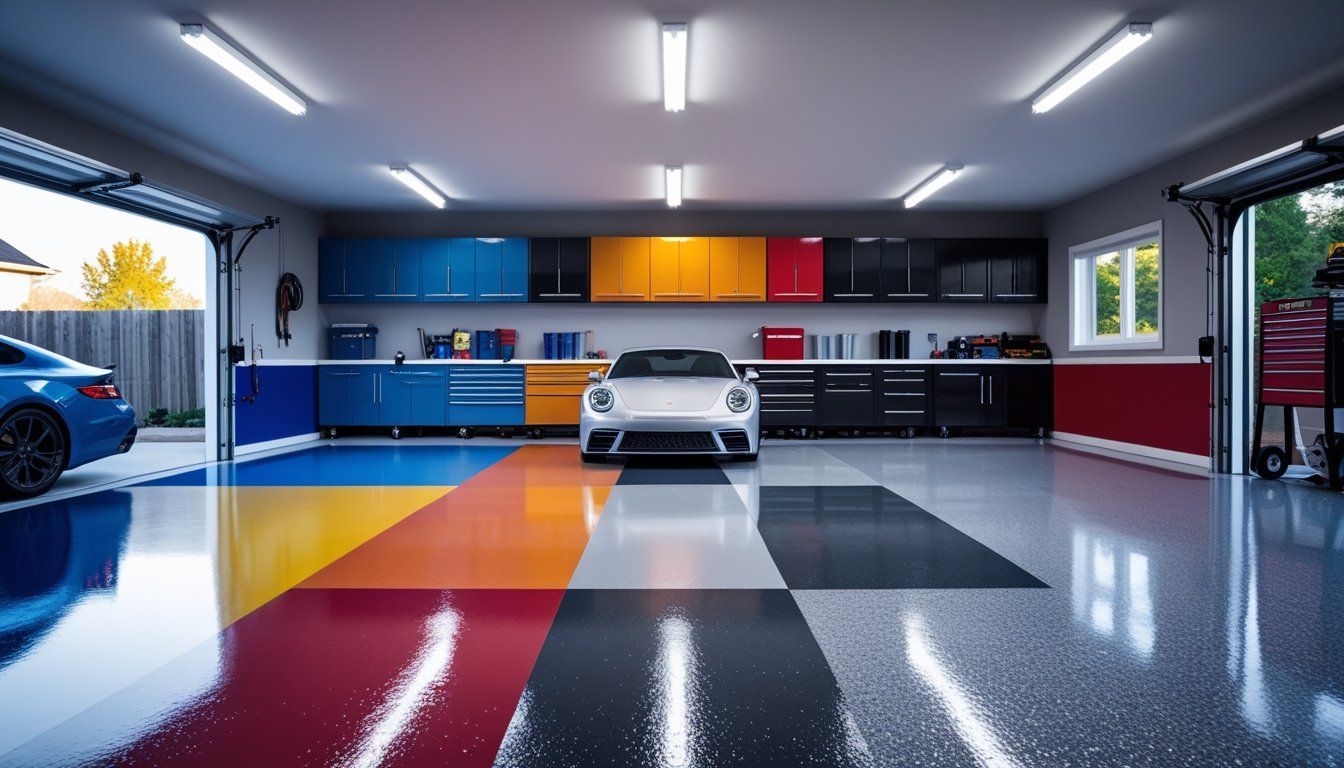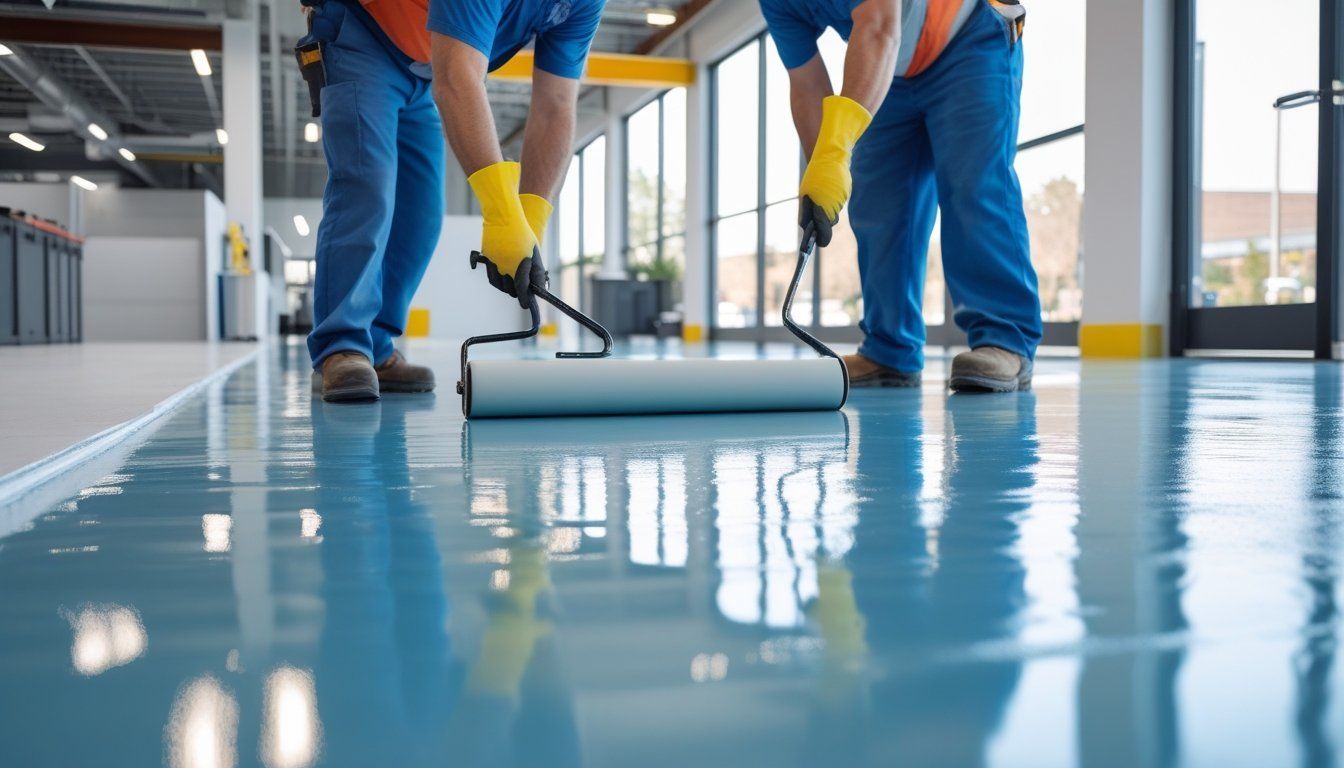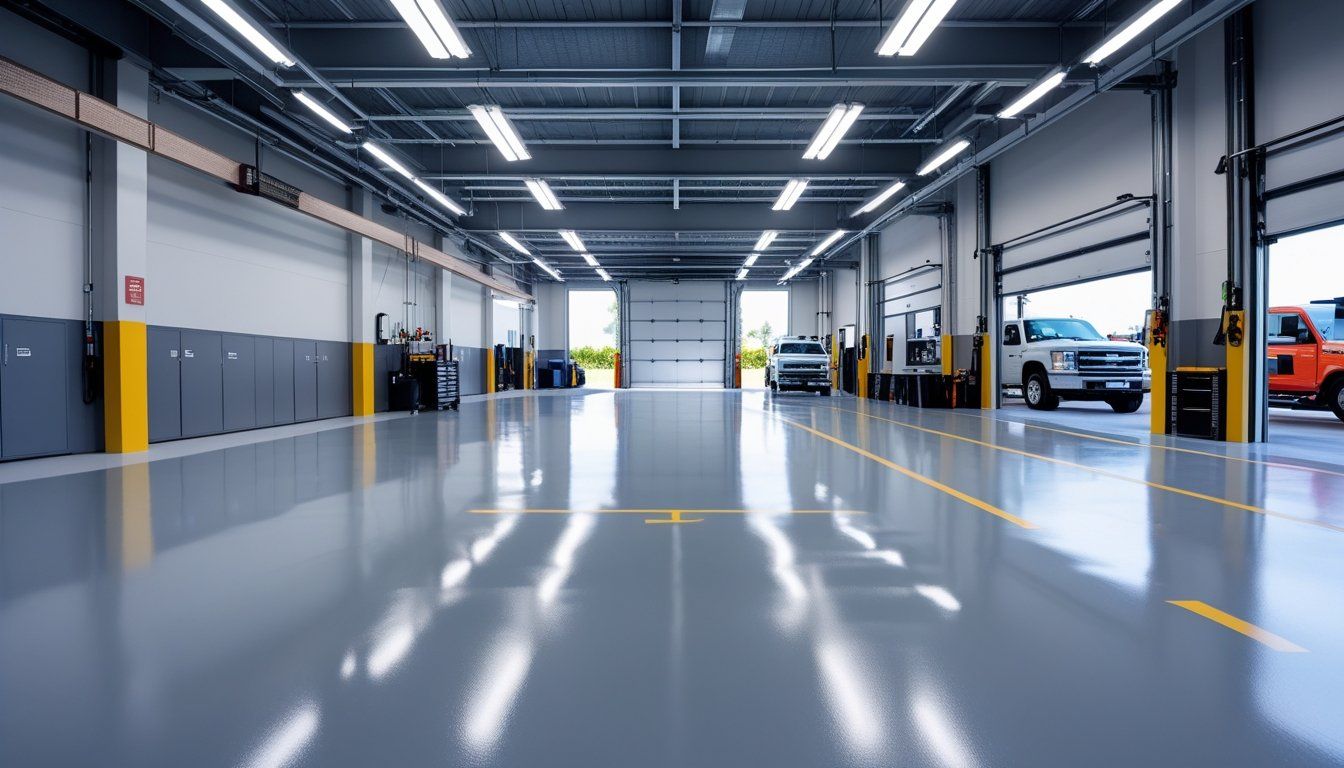Epoxy Industrial Flooring Systems in Cambridge MA
Daniel McGonagle • October 22, 2025
Industrial facilities demand floors that can handle heavy use while staying safe and easy to maintain. Epoxy industrial flooring systems deliver exceptional strength, resistance to chemicals, and a smooth, seamless finish that stands up to years of traffic and machinery.
Cambridge MA Epoxy Flooring installs durable, high-performance epoxy systems designed for warehouses, plants, and production spaces.
Each floor is built to resist spills, impact, and wear—while keeping your facility clean and professional.
In this article, you’ll learn how epoxy industrial flooring systems work, what benefits they provide, and how to choose the right type and design for your space. You’ll also find tips on installation, maintenance, and cost planning for long-lasting results.
What Are Epoxy Industrial Flooring Systems?
Epoxy industrial flooring systems create a smooth, tough surface by layering epoxy resin over concrete. These floors are designed to handle heavy use, resist chemicals, and stay easy to clean. They also offer design options that help your workspace look professional and safe.
Key Features and Benefits
Epoxy floors bond tightly to your concrete, creating a seamless and hard surface. This makes them resistant to cracks, stains, and heavy traffic. They handle forklift traffic, spills, and chemicals without losing strength.
The glossy finish is easy to maintain and clean, helping reduce downtime in busy spaces. Epoxy floors improve safety by offering anti-slip textures you can choose from. We focus on durability, style, and safety so your industrial floors last and perform well in Cambridge and the Greater Boston area.
Types of Epoxy Flooring Systems
There are several types of epoxy flooring, each suited to different needs:
- Standard Epoxy Coatings: Basic protective layers for warehouses and factories.
- Self-Leveling Epoxy: Creates a smooth, flat surface to hide imperfections.
- Mortar Epoxy: Extra thick and resistant, best for heavy impact and abrasion.
- Anti-Static Epoxy: Prevents static electricity, crucial for labs and electronics work.
Choosing the right system depends on your facility's use, traffic level, and safety requirements.
How Epoxy Differs from Other Industrial Floorings
Unlike regular concrete or tile, epoxy flooring forms a tough, bonded layer that won’t chip or peel easily. It is much thicker and more durable than paint or sealants.
Epoxy floors are also more chemical-resistant and easier to repair than vinyl or rubber flooring. Compared to urethane or polyaspartic coatings, epoxy offers a balance of cost, durability, and aesthetics for many industrial spaces.
If you need floors that stand up to demanding work while providing a clean, safe surface, epoxy is often the best choice.
Application Process for Epoxy Industrial Flooring
Applying epoxy flooring involves careful preparation, precise mixing, and proper curing to create a durable and lasting surface. Each step plays a key role in making sure the floor holds up under heavy use and looks great over time.
Surface Preparation Steps
The first step is preparing the concrete surface. This includes cleaning the floor thoroughly to remove dirt, grease, and dust. Any cracks or low spots must be repaired to create a smooth, even base. Next, the floor is often ground using a diamond grinder.
This roughens the surface so the epoxy sticks well. After grinding, vacuuming removes all debris and dust. Finally, a primer coat is applied. This improves the bond between the concrete and the epoxy.
Some primers also block moisture coming up from the slab, which can cause problems later. Proper surface prep is critical, especially for industrial floors where wear and tear are heavy.
Epoxy Mixing and Application
Mixing the epoxy correctly is very important. You mix two parts: the resin and the hardener. These must be combined in the right amounts and stirred well to activate the chemical reaction. Once mixed, you apply the epoxy using tools like squeegees and rollers.
Start at the farthest corner and work toward the exit to avoid stepping on wet epoxy. If desired, anti-slip additives or decorative quartz chips can be spread on while the epoxy is still wet.
This adds safety and helps with traction in busy areas. Many industrial jobs call for multiple coats. The first builds thickness, and the second topcoat provides durability and finish quality.
Curing and Finishing Methods
After application, the floor needs time to cure. Curing generally takes 24 to 48 hours, but full hardness can take up to a week. During this time, keep the area clean, dry, and protected from heavy traffic. Temperature and humidity affect curing speed.
Ideal conditions help the epoxy harden evenly without cracks or bubbles. Once cured, a final clear urethane or sealer may be applied for added protection, chemical resistance, and gloss.
This step extends the floor’s life, especially in industrial settings with chemicals or heavy machinery.
Industries and Environments That Benefit from Epoxy
Epoxy flooring works well in places that need strong, safe, and easy-to-clean floors. It protects surfaces from heavy use, chemicals, and spills. You get floors that last longer and look good with less upkeep.
Manufacturing Facilities
In manufacturing plants, your floors face heavy machines, constant foot traffic, and chemical spills. Epoxy floors handle all this without cracking or wearing down. They resist oils and cleaners, which keeps your workspace safe and clean.
You can customize colors for work zones or safety markings. This helps keep your factory organized and reduces accidents. Plus, epoxy floors are easy to clean and don’t need frequent repairs, saving you time and money.
Warehouses and Distribution Centers
In warehouses, floors take a lot of abuse from forklifts, pallets, and constant loading. Epoxy flooring protects against dents, scratches, and stains from chemicals or spilled liquids. Its slip-resistant surface keeps your team safer when moving fast.
Since epoxy is seamless, dirt and dust don't get stuck in cracks. It also holds up well against heavy traffic and sudden impacts. When you upgrade with epoxy, you lower maintenance costs and downtime in busy storage spaces.
Pharmaceutical and Healthcare Settings
Hospitals and labs need floors that support hygiene and safety. Epoxy flooring is non-porous, which means it stops bacteria and germs from building up. It’s resistant to harsh cleaning agents, helping you maintain strict sanitation rules.
The smooth surface reduces dust and allergens and offers good chemical resistance for spills. You can choose anti-slip textures to keep employees and patients safer. Your space stays safer and cleaner with less hassle.
Food and Beverage Production
Floors in food processing areas must handle moisture, heat, and strong chemicals. Epoxy flooring is waterproof and resists stains from oils, acids, and cleaning products. It also meets health codes because it doesn’t absorb bacteria.
Safety is key, so you can add slip-resistant coatings to reduce accidents. Since epoxy lasts through heavy foot and machine traffic, you avoid costly repairs and stoppages. Your production environment stays clean, safe, and productive.
For local businesses in Cambridge and Greater Boston, awesome companies offer tailored solutions that fit your industry’s needs. Contact us today to find the right industrial epoxy floor for your space.
Key Performance Properties of Epoxy Flooring
Epoxy industrial flooring offers a strong mix of durability, safety, and easy upkeep. Its chemical makeup and surface features make it ideal for tough work environments while keeping your floors clean and secure.
Below are the most important properties that ensure epoxy floors meet industrial needs.
Chemical and Impact Resistance
Epoxy flooring is made by mixing resin and hardener, which creates a solid plastic that tightly bonds with concrete. This results in a surface that can handle heavy impacts from machinery, dropped tools, and constant foot traffic without cracking or chipping.
Chemical spills like oils, acids, and cleaning agents won’t easily damage epoxy floors. This resistance helps prevent stains and surface wear, so your floors look good longer.
If you work in a factory or warehouse, this means less downtime for repairs and better protection against costly chemical damage.
Slip and Moisture Protection
Slip resistance is critical in busy industrial spaces. Epoxy coatings can be mixed with special additives to create anti-slip surfaces.
These textures help reduce
the risk of falls even when the floor is wet or oily. Epoxy floors also create a seamless barrier that stops moisture from seeping into the concrete below.
This stops mold growth and protects the floor from weakening over time. For places in Cambridge and Greater Boston with damp conditions, moisture protection adds to the life of your floor.
Hygienic Qualities
Smooth epoxy floors are easy to clean, helping maintain a hygienic environment in your workspace. The tight bond to concrete means no cracks or gaps where dirt, bacteria, or chemicals can hide.
This makes epoxy ideal for laboratories or food processing areas where cleanliness matters. You’ll find maintenance simple—routine sweeping and mopping are enough to keep floors looking new.
Our team installs systems that combine durability with these hygienic benefits to suit local industrial needs.
Maintenance and Longevity Tips
To keep your industrial epoxy flooring in the best shape, focus on regular cleaning and timely repairs. These steps help prevent damage and extend the life of your floor, saving you money and hassle in the long run.
Routine Cleaning Practices
Daily sweeping or dusting removes dirt and grit that can wear down your epoxy surface. Use a soft broom or dust mop to avoid scratches. For deeper cleaning, mix a mild detergent with warm water. Avoid harsh chemicals, as they can damage the floor’s protective layer.
Clean spills quickly to prevent staining. Place rubber mats or pads in high-traffic areas and under heavy equipment.
This reduces abrasion and helps your floor last longer. Regular cleaning keeps your floor looking great and protects it from everyday wear, especially in busy industrial spaces.
Repair and Touch-Up Guidelines
Inspect your floor often to spot chips, cracks, or worn spots early. Small repairs prevent bigger problems and preserve durability. For minor damage, use a compatible epoxy patch or coating. Follow manufacturer instructions closely for the best results.
If areas show heavy wear, contact local experts who can handle professional touch-ups or full repairs. Avoid delaying repairs because timely fixes keep your floor safe and prevent costly downtime in your facility.
Design and Customization Options
Your epoxy industrial flooring can be more than just tough and durable. It can also reflect your style and meet your facility’s specific needs. The right design choices improve safety, boost your space’s look, and make cleaning easier.
Epoxy’s Aesthetic Range In Modern Projects
Architectural Digest highlights epoxy as a tough, seamless finish
that can deliver high-gloss, modern looks beyond industrial use. Designers leverage its uniform surface and reflective sheen to brighten interiors and create a contemporary feel.
For client-facing areas like showrooms or lobbies, consider metallic tints or colored systems that balance durability with curated design. This bridges performance needs with brand-forward aesthetics.
Color and Texture Choices
You can choose from many colors to match your brand or workspace. Solid colors provide a clean, professional look. Mixed colors or flakes can hide dirt and wear better, which is helpful in busy industrial settings. We offer options like metallic finishes or matte surfaces if you want a unique style.
Textures are also important. You might want a smooth surface for easy cleaning, or a rougher finish that adds grip. Anti-slip textures increase safety and reduce accidents. These variations help your floor perform well under different conditions and keep workers safe.
Logos and Safety Markings
Adding logos to your epoxy floor makes your space look professional and branded. A logo also helps guests and employees recognize your business easily. You can place logos in entryways, showrooms, or main work areas. Safety markings are critical in industrial areas.
You can install clear lines, zone markings, or hazard symbols within the epoxy floor. These markings guide foot traffic, separate work zones, and highlight danger spots. Using bright colors for these markings improves visibility and helps maintain safety standards every day.
Potential Challenges and Solutions
When you install epoxy industrial flooring, surface preparation is one of the biggest challenges. The concrete must be clean, dry, and smooth. Any cracks or stains need fixing before applying the epoxy. Skipping this can cause poor adhesion and peeling over time.
Tight project timelines can also be a problem. Your business might need the floor ready quickly without shutting down operations.
Planning the work in phases and using fast-curing epoxy products can help minimize downtime and keep your facility running smoothly. Safety and hygiene standards are important, especially in industrial settings.
Your floor should resist chemicals, spills, and heavy traffic while offering anti-slip features.
Choosing a local company
means you get expert advice and tailored solutions for your industrial needs. We focus on quality and clear communication to deliver floors that last.
Cost Considerations for Epoxy Industrial Flooring
When thinking about epoxy industrial flooring, the cost usually ranges from $4 to $12 per square foot. Your final price depends on factors like the size of your space, the condition of your floor, and the type of epoxy system you choose.
Surface preparation is an important part of the cost. If the concrete is cracked or stained, it may need extra work before applying epoxy. This step helps the floor last longer and look better. You might also pay more for special finishes, like anti-slip coatings or decorative textures.
These add safety and style but can increase the cost. Labor fees vary depending on the experience of your contractor.
Choosing a reliable local installer can save you money over time by reducing maintenance and repairs.
Why Choose Epoxy for Industrial Flooring?
Epoxy flooring is a smart choice for industrial spaces because it is very durable. It can handle heavy traffic, machinery, and chemicals without wearing down quickly. This means your floors stay strong and look good for a long time. Another important benefit is easy maintenance.
Epoxy floors resist dust, stains, and spills. You can clean them quickly, saving you time and effort. This keeps your workspace safer and more efficient every day. Safety matters in busy industrial environments. Epoxy coatings can include anti-slip properties to reduce accidents.
They also offer resistance to chemicals and heat, protecting your floors and your workers. You can also customize the look and feel of your floor. From colors to textures, epoxy can be designed to fit your industrial environment perfectly.
Local expertise helps you pick the best style and function for your space. Epoxy flooring is a cost-effective investment. Its long life reduces replacement and repair costs. Plus, it supports a cleaner and safer work area, which can improve overall productivity.
Build Stronger, Safer Industrial Spaces With Epoxy Floors
Epoxy industrial flooring systems combine durability, safety, and easy maintenance to create long-lasting protection for any facility. From warehouses to laboratories, these floors stand up to heavy machinery, spills, and daily wear while maintaining a clean, polished appearance.
Cambridge MA Epoxy Flooring delivers expert installation and tailored solutions throughout Greater Boston.
Their team focuses on precision, durability, and visual appeal—ensuring your epoxy floors perform flawlessly under demanding conditions.
Ready to upgrade your workspace with reliable, low-maintenance epoxy floors?
Contact us today
for a free consultation and discover how our flooring systems can strengthen and enhance your industrial environment.
Frequently Asked Questions
Epoxy flooring systems offer strong protection and easy cleaning for busy industrial areas. You’ll find answers here about costs, installation time, and how to choose the right floor coating for your space.
What Are the Main Advantages of Installing Epoxy Flooring in an Industrial Setting?
Epoxy floors seal and protect concrete from cracks, chemicals, and heavy wear. They harden the surface, making it easier to clean and maintain. You also get better safety with anti-slip textures and a smooth, finished look that fits industrial needs.
How Much Should I Expect to Invest in an Epoxy Flooring System in a Commercial Space?
Costs vary based on size, floor prep, and finish type. For commercial or industrial spaces, pricing often ranges from $3 to $12 per square foot. Adding anti-slip or decorative features can increase the price slightly.
What Is the Difference Between Polyurea and Epoxy Floor Coatings?
Epoxy floors take longer to cure but offer excellent hardness and chemical resistance. Polyurea coatings dry much faster and handle heavy traffic well, but may cost more upfront. Your choice depends on how soon you need the floor ready and what kind of use it will see.
How Do I Maintain and Clean Industrial Epoxy Flooring to Ensure Its Longevity?
Keep epoxy floors clean by sweeping and mopping with mild soap and water. Avoid harsh chemicals or abrasives that can damage the surface. Regular cleaning helps prevent stains and keeps floors looking fresh longer.
What Factors Should I Consider When Choosing the Best Epoxy Flooring for My Business?
Look at traffic levels, chemical exposure, and safety needs in your space. You’ll want a floor that lasts under your daily use.
Colors and textures also matter if you want a polished look that fits your company’s style. Cambridge MA Epoxy Flooring can help you pick options suited to your specific needs.
How Long Will It Take to Install an Epoxy Flooring System in a Large Industrial Area?
Installation typically takes 1 to 3 days for medium-sized floors. Cure time varies—light foot traffic can start after 24 to 72 hours. Full chemical resistance often takes up to a week. Weather and floor prep quality affect timing, too.
